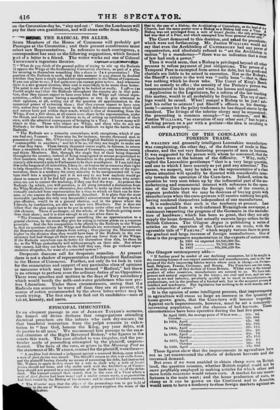OPERATION OF THE CORN-LAWS ON FOREIGN TRADE.
A WEALTHY and generally intelligent Lancashire manufacturer was complaining, the other day, of the dulness of trade in Man- chester, and the not very flattering prospects of men in business. It was suggested by the person with whom he conversed, that the Corn-laws were at the bottom of the difficulty. " Why, really,* replied the Lancashire gentleman " that is a very large question, and one to which I have scarcely as yet paid any attention." This person, we suspect, may be taken as the representative of a class whose attention will speedily be directed with considerable inten- sity towards the operation of the Corn-laws. Indeed, unless the question be very soon taken up by the influential part of the ma- nufacturing and commercial interest with reference to the opera- tion of the Corn-laws upon the foreign trade of the country, it appears probable that we may be desirous of buy ing grain with manufactures when the corn-growers will receive nothing but gold, having rendered themselves independent of our manufactures, It is undeniable that such is the tendency at present. Last week we quoted from a well-informed Birmingham newspaper, a statement respecting the progress of the Germans in the manufac- ture of hardware ; which has been so great, that they not only supply the home demand, but actually execute large orders for the British Colonies. The Glagow Argus is publishing a series of articles on the operation of the Corn-laws on trade, with the agreeable title of " FAMINE ;" which supply various facts to prove the gradual and large increase of foreign manufactures. One of these is the progressive augmentation in the exports of cotton twist. In 1831 we exported 58,846,308 lbs.
In 1834 78,712,330 lbs.
In 1837 105,106,529 lbs.
Our Glasgow contemporary adds-
" If further proof be needed of our declining commerce, let it be sought is the counting-houses of our export merchants and manufacturers, and in the low pieta of the daily improving fabrics woven where corn is cheap,—in Switzer- land, Belgium, France. Germany, and Russia. The Corn-laws are the cauw, and the only cause, of this decline of Great Britain. Whilst corn is the natural product of other countries, manufactures are natural to us. We have indi- genous and natural superiority in the latter ; our coal and iron, and our eons nence in art and industry, peculiarly qualify us to excel in manufactures—to predominate, not in the produce of a limited soil, but in the sonjunet powers of intellect and machinery. But legislation has nothing to do with reason, and is quite independent of nature." It is the opinion of some intelligent persons, that improvements in agriculture will cause so large an increase in the quantity of home-grown grain, that the Corn-laws will become nugatory. Against such improvements, however, must be set a constantly- increasing population, and the chances of bad harvests. These circumstances have been operative during the last five years. In April 1833, the average price of Wheat was ... 53s. 8d.
October 52s. lfid.
In 1834, April 47s. 8d.
October 43s. 11d.
In 1835, April nos. 11d. October :39s. 2d. In 1836, April 44g. 7d. October 47s. lint. In 1837, April 56s. 44. October 56s. 1d. In 1338, April 57s. 10d.
These figures show that the improvements in agriculture have not as yet counteracted the effects of deficient harvests and the increased demand.
But even if we were enabled to obtain cheap corn on British land, the question remains, whether British capital could not be more profitably employed in making articles for which other and more fertile countries would return corn. A market for our manu- factures is the main want ; and the home production of corn, as cheap as it can be grown on the Continent and in America, would seem to have a tendency to close foreign markets against us.


























 Previous page
Previous page